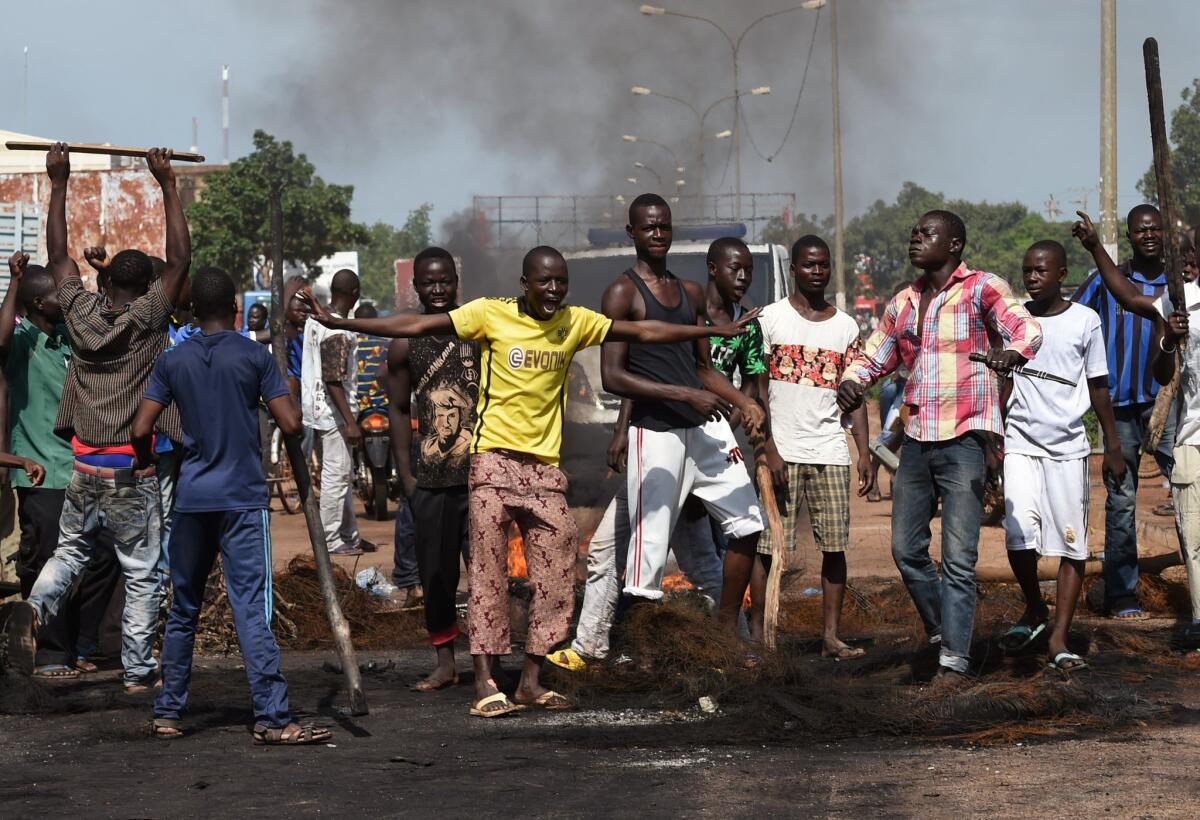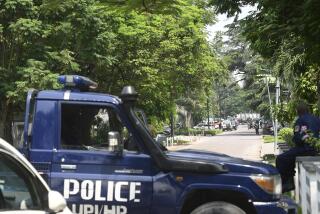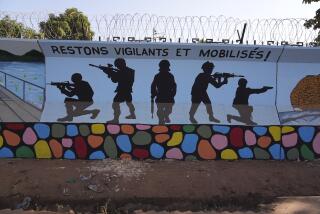Burkina Faso coup leader faces military pressure to step down

Demonstrators shout slogans next to burning tree branches in Ouagadougou, the capital of Burkina Faso, during a protest against a regional proposal to give amnesty to coup leaders.
- Share via
Reporting from Johannesburg, South Africa — The message to Burkina Faso’s coup leaders on Monday could not have been clearer: Protesters burned tires and set up roadblocks as they rejected a deal that would give amnesty to those who had ousted a transitional government just weeks before an election.
Opposition to last week’s coup was conveyed in one extraordinary scene, posted on Facebook, in which hundreds of young men on motorcycles with their horns blaring ushered one of several army convoys heading to the capital, Ouagadougou. The military threatened to confront the more powerful presidential security regiment that carried out the uprising.
Soon after, the coup leader, Gen. Gilbert Diendere, appeared to give ground. He apologized to the nation and the international community in a statement late Monday and said he was willing to relinquish power once there was an agreement reached to end the crisis.
The coup leaders last week arrested the transitional president and prime minister and suspended parliament. The coup came a year after a popular revolt overthrew President Blaise Compaore, who had been in power for 27 years and was determined to extend his rule yet another five years. He was forced out of office, and reformers in the transitional parliament banned members of his regime from contesting elections that were due to be held next month.
Leaders of the Economic Community of West African States, or ECOWAS, including Senegalese President Macky Sall, are mediating the current conflict. There are still some unanswered questions: Will Diendere, a close Compaore ally, and other coup leaders be granted amnesty or be allowed to flee the country? And will the coming election be open to members of the Compaore administration?
Diendere’s statement said he deplored the bloodshed that had taken place and offered his condolences to the families of those who had been killed, reportedly about 10 people. He added that he was committed to work for the unity of the military.
As he issued his statement, the impoverished, landlocked West African nation was poised on a knife-edge after army commanders announced they would remove the coup leaders “without bloodshed” and ordered the presidential security regiment to stand down.
“All of the nation’s armed forces are converging on Ouagadougou with the sole goal of disarming the presidential guard without bloodshed. We ask them to immediately lay down their arms and go to Camp Sangoulé Lamizana, and they and their families will be protected,” the army commanders said in a statement, referring to a barracks in the west of the city.
Army forces were poised several miles from the city, according to local media.
NEWSLETTER: Get the day’s top headlines from Times Editor Davan Maharaj >>
A deal hammered out through mediation with ECOWAS leaders on the weekend would have given Diendere and the regiment amnesty, and members of the former Compaore government would have been allowed to seek office.
But the deal was widely condemned by reformers and was swiftly dubbed the “accord of shame” by Burkinabe people who took to Twitter to express their disgust.
Diendere’s statement Monday agreeing to stand down raised hopes that the African military coups of yesteryear are no longer feasible, with African leaders united against unconstitutional transitions of power and willing to back up that position with sanctions and tough action.
Diendere had earlier announced that he would free transitional President Michel Kafando. Monday he also said he was willing to free transitional Prime Minister Isaac Zida in a gesture of reconciliation. He said he would return the country to civilian rule, once there was a definitive resolution.
The coup, apparently an effort by the unpopular former ruling party to engineer elections on its own terms, was condemned internationally and triggered the country’s suspension from the African Union.
The U.S. Embassy on Monday urged Burkinabe to refrain from violence and said it was involved in continuing dialogue aimed at ending the crisis.
“We call on all parties to not to resort to using violence,” the embassy said in a tweet. “We are now in open dialogue.” It called on people to allow their leaders to settle the crisis through dialogue to avoid the loss of life.
Kafando told Radio France International he had not been consulted about the deal reached over the weekend under ECOWAS mediation and had serious reservations about it.
Follow @robyndixon_LAT on Twitter for news out of Africa
MORE WORLD NEWS:
Paraplegic in Pakistan prison now set to be executed
Tight-knit no more? Refugee crisis threatens EU ideal of unity
Protesters in Mexico attack government office over missing students
More to Read
Sign up for Essential California
The most important California stories and recommendations in your inbox every morning.
You may occasionally receive promotional content from the Los Angeles Times.










